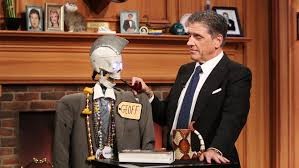Some people think of me as an expert in a few things, which is okay. It is not okay, however, that I have acted like an expert in most things...if not all things on occasion.
This awareness is part of the understanding that comes with experience and maturity (which is a nice way of saying "age"). That it took me a while to arrive at this self-understanding is a bit embarrassing yet I'm glad I did. It has dramatically changed how I try to work with individuals and groups. Even more, I think it has changed my relationship with them for better.
The problem with being an expert on anything is that we imagine it comes with a license to weigh in on everything, no matter how remotely related to our actual expertise. It is even worse when we experts become leaders. Leadership implies responsibility and now, along with our license, we feel a duty to share our expertise with everyone we can, whenever we can, wherever we can, and to the fullest extent possible. Makes us great party guests, huh?
When we experts are put in leadership of a team, a coalition, a collaboration, a backbone organization, or a collective impact initiative, it becomes especially important for us to exercise self-control.
Only when we lay aside what we think we know and lay down our leader/expert role can we hear more clearly the expertise of others and the wisdom of the collective.
 So, this is where Craig Ferguson's advice comes into play. In a stand-up comedy special he performed in 2011 titled Does This Need to be Said?, Ferguson
So, this is where Craig Ferguson's advice comes into play. In a stand-up comedy special he performed in 2011 titled Does This Need to be Said?, Ferguson
offered three self-reflective questions. In one of his best lines, he also said it took him three marriages to learn them. Besides their potential for saving marriages, they are also important questions for us leader/experts to consider before sharing our wisdom.
Let's take a brief look at each of Ferguson's questions:
Does this need to be said? Collaboration work is full of ups and downs. There will always be a temptation for us leader/experts to step in to try to solve, explain or otherwise smooth the way. In reality, the way does not always have to be smoothed. Often it is in theprocess of working together, through both good and bad, that challenges are met by groups with innovative solutions which produce the best outcomes.
Does this need to be said by me? Truthfully...probably not. I'm learning that if I shut up, allow space for others to speak up while I simply listen, then if it needs to be said at all, others will say it. I'm learning there is often a difference between what I see as an issue and what the group sees as an issue.
Does this need to be said by me now? You see, when I put on my leader/expert Super X-ray Glasses I can see many things that mere mortals cannot. Further, my expertise may tell me that "this is gonna be a problem and we gotta deal with it now." When I shut up, keep my opinions to myself, and just listen, what I have learned is: a) if my analysis is correct, then others will usually see it too, name it, and the group will address it; b) my analysis may be only partially correct and the group may feel there are other issues (which my analysis may have missed or minimized) that it needs to address first; or c) if my analysis is dead wrong, the group will move to other issues which, once resolved, tend to take care of the issue I diagnosed.
A more academic presntation of Ferguson's three questions comes from one of my favorite organizational culture authors, Edgar Schein. In his article On Dialogue, Culture, and Organizational Learning, Schein described "suspension" as a critical aspect of productive group dialogue. "Suspension" is to stop talking and listen: "to let the issue - our perceptions, our feelings, our judgments, and our impulses - rest for a while in a state of suspension to see what more will come up from ourselves and from others" (p. 33).
More pragmatically, I have to come to call this "listening for crickets." This is the time of year for cicadas to make their presence known. I love the sound of cicadas - for this native Iowa country boy their annual symphonies are the quintessential sound of summer. Admittedly, cicadas can be quite loud and intrusive. Crickets, on the other hand, often require us to suspend our activity and to listen quietly for their "voices." This is what we leader/experts must also do to make sure all voices can be raise, are included, and clearly heard and understood in the collaborations we lead.
Today, I am building my expertise in listening for crickets and trying to lead by that example. In doing so I hope other leader/experts will follow and, even more, that the crickets among us will speak out and be heard. After all, listening for crickets is one of the most important competencies for any collaboration leader. Let's get better together.
Be Greater. (Listen for Crickets.) Do Good. Everyday.





